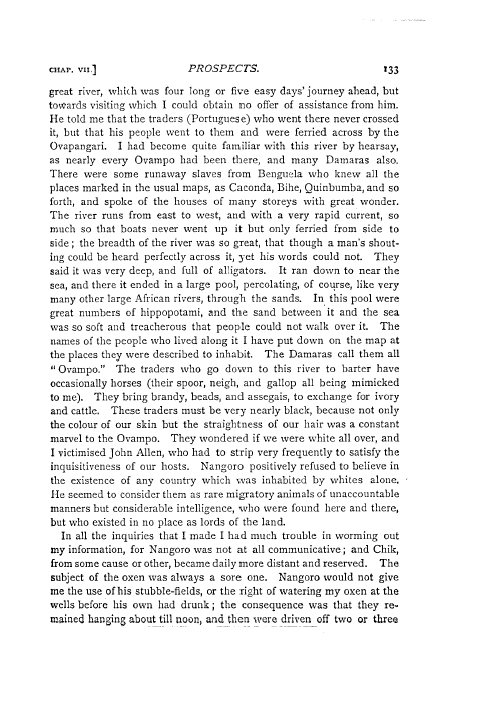CHAP. VII,]
PROSPECTS.
133
great river, which was four long or five easy days' journey ahead, but towards visiting which I could obtain no offer of assistance from him. He told me that the traders (Portuguese) who went there never crossed it, but that his people went to them and were ferried across by the Ovapangari. I had become quite familiar with this river by hearsay, as nearly every Ovampo had been there, and many Damaras also. There were some runaway slaves from Benguela who knew all the places marked in the usual maps, as Caconda, Bihe, Quinbumba, and so forth, and spoke of the houses of many storeys with great wonder. The river runs from east to west, and with a very rapid current, so much so that boats never went up it but only ferried from side to side; the breadth of the river was so great, that though a man's shouting could be heard perfectly across it, yet his words could not. They said it was very deep, and full of alligators. It ran down to near the sea, and there it ended in a large pool, percolating, of course, like very many other large African rivers, through the sands. In this pool were great numbers of hippopotami, and the sand between it and the sea was so soft and treacherous that people could not walk over it. The names of the people who lived along it I have put down on the map at the places they were described to inhabit. The Damaras call them all " Ovampo." The traders who go down to this river to barter have occasionally horses (their spoor, neigh, and gallop all being mimicked to me). They bring brandy, beads, and assegais, to exchange for ivory and cattle. These traders must be very nearly black, because not only the colour of our skin but the straightness of our hair was a constant marvel to the Ovampo. They wondered if we were white all over, and I victimised John Allen, who had to strip very frequently to satisfy the inquisitiveness of our hosts. Nangoro positively refused to believe in the existence of any country which was inhabited by whites alone. He seemed to consider them as rare migratory animals of unaccountable manners but considerable intelligence, who were found here and there, but who existed in no place as lords of the land.
In all the inquiries that I made I had much trouble in worming out my information, for Nangoro was not at all communicative ; and Chik, from some cause or other, became daily more distant and reserved. The subject of the oxen was always a sore one. Nangoro would not give me the use of his stubble-fields, or the right of watering my oxen at the wells before his own had drunk; the consequence was that they remained hanging about till noon, and then were driven off two or three

